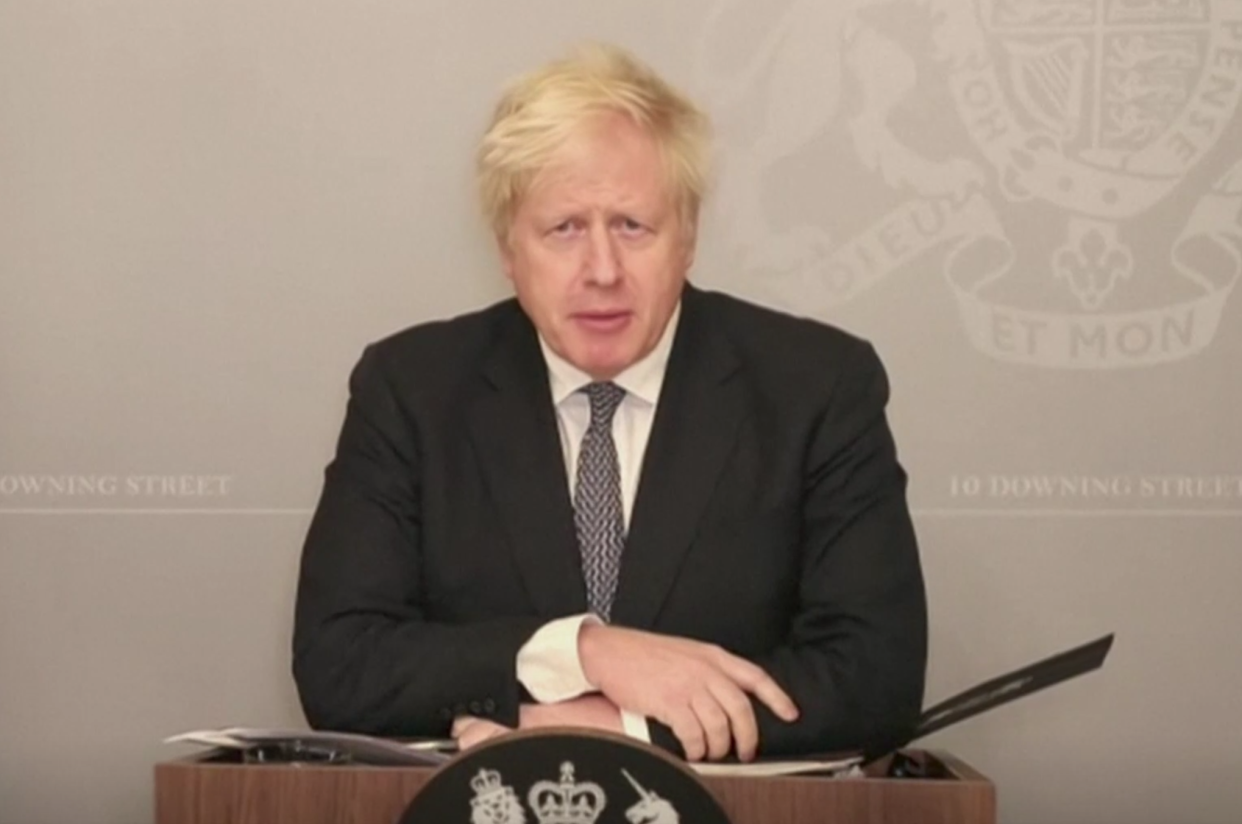Boris Johnson looked rather too cheerful for a leader demanding further sacrifice

The prime minister, answering questions in the Commons via a glitchy video connection
(Reuters TV)Boris Johnson cannot decide whether he is the new Winston Churchill or providing the next comedy skit for Have I Got News for You. He began his statement about what will happen at the end of the lockdown next week by admitting: “No other peacetime prime minister has asked so much of the British people.”
It was all he could do, we suspected, to hold himself back from saying something about the news of the Oxford vaccine being the beginning of the end. Instead, he said it was “the most hopeful advance of all” and a “wonderful British scientific achievement”.
He certainly looked like a man who knew he was about to be released from confinement: he gets out of self-isolation on Thursday, but he also expects to get out of the prison of repeated lockdowns and misery early next year. Meanwhile, however, he has to try to persuade the nation that the threat is still serious between now and then – and that was when he slipped from the Churchillian to the comic: “This virus obviously isn’t going to grant a truce. It doesn’t know it’s Christmas.”
He faces a similar problem to that faced by Churchill towards the end of the war, when everyone knew that the war was going to be won, but that great sacrifices were still required. Johnson tried out some Churchillian phrases – “this will be a hard winter”; “there is a long road to spring” – but sounded happier in the jocular register – “the scientific cavalry is now in sight”.
Neither tone sounded right for convincing sceptical Conservative MPs, who regard the tiered system of restrictions as no better than the lockdown, itself an unwarranted intrusion on ancient liberties. Even the mild Damian Green quoted a constituent of his who said that “if the government imposes stupid rules, we will stop obeying the sensible ones”.
Mark Harper, a former chief whip, commented blandly with a hint of House of Cards menace that many of his colleagues “will hold their judgements until we know which areas are in which tier” – which the prime minister said he hoped to announce on Thursday.
Keir Starmer, the Labour leader, was not happy about the delay. “I do acknowledge this is not easy,” he said, trying to sound terribly reasonable. “People need to know so they can plan.” But on the other hand, it makes sense to leave the decision until the last moment, so that the latest information about infection levels can be taken into account.
Johnson recognised that if he has a problem between now and the promised land of mass vaccination, it comes from his own side rather than the opposition. He knows Labour MPs will vote for the new, slightly strengthened tiers, whatever the rules and whatever areas are in each tier. So he told Starmer sarcastically: “I am grateful for such support as he felt able to offer at this stage. I’m aware that his support is one of these things – now you see it and now you don’t; but never mind, I shall take it while it seems to be there at least temporarily.”
But Johnson doesn’t want to rely on the votes of Labour MPs to get the regulations through the House of Commons. So it looks as if the vote will be delayed until next week, on Monday or Tuesday, before the new rules come into effect on Wednesday.
Even so, the prime minister seemed to be unwilling to put much effort into persuading his own MPs to support him. While he was replying to the second question from a Tory MP, we lost the audio connection to 10 Downing Street (350 yards away from the chamber of the House of Commons). In scenes reminiscent of Blackadder pretending that he has a bad telephone line and so cannot hear the order to advance out of the trenches, the prime minister’s Zoom session had to be abandoned. “Some problem with the sound,” we heard Johnson shout, just as his screen was turned off.
The Commons sitting was suspended for three minutes and continued with Matt Hancock, the health secretary, substituting for the prime minister. Johnson returned to screens in the chamber nearly an hour later, but he had sadly missed questions from, among others, Sir Graham Brady, chair of the 1922 Committee and ringleader of the libertarian revolt against coronavirus restrictions.
We couldn’t tell in the end whether Johnson thinks the Tory rebellion against his rules is a serious threat to the nation’s health and his government’s authority – or a bit of a joke.
Read More
What lockdown tier am I in and what are the new rules?
Boris Johnson rejects advice to create new tier 4 in England
Feed drops out during Johnson’s speech announcing end of lockdown
New restrictions in place until spring, Boris Johnson announces

 Yahoo Movies
Yahoo Movies 
